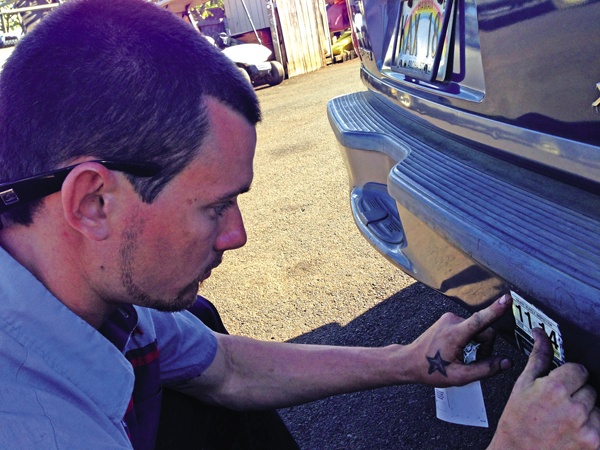Less is more
LIHUE — Certified safety check stations across the state recently started handing out smaller safety check stickers for motor vehicles — at a higher price.
Beyond a 33 percent fee increase that went into effect Nov. 1, there is more to the new system.
Like technology upgrades that make sticker printing more efficient.
“The safety check stations now print out their own form and sticker,” said Ivan Miller, Kauai County motor vehicle control inspector.
Another difference: Instead of two stickers, automobiles that pass their safety inspection will only have to put one sticker on their bumper.
The old system had a sticker for the month, and another color-coded one for the year. The new system condenses both into a single black and white one indicating the month and year.
But the fees did go up.
For cars and trucks, the annual safety check fees went to $19.19 from $14.70; and for trailers and motorcycles, the fees went to $13.24 from $8.75, according to Miller. Sales tax is on top of the fee.
A bulk of the fee, about $19 after taxes, goes to the service station doing the work, while $1.70 goes to the state Department of Transportation to pay for administration and enforcement. The contractor providing the equipment gets $1.69, officials said.
Some people, however, may pay a little more for a safety check. Miller said stations have the discretion to charge an additional $5 fee to measure the window tint and another $5 to check the headlight angle of a vehicle that has been lowered or lifted.
Chase Koulbanis, from Garden Isle Auto Repair, said they have been using the new printing system for about two weeks and it is more efficient than the old one. His boss no longer has to make frequent trips to the Department of Motor Vehicles to pick up safety stickers, he said.
“Everything is done here on the computer,” said Koulbanis, showing a contractor-provided iPad and a printer.
Lihue resident David Ward pulled in at the auto shop across the street from the bowling alley in Lihue to get a safety check for a Ford Explorer.
After inspecting the company car, Koulbanis took out the iPad and snapped a picture of the Explorer and another of its documentation.
“We also take a picture of the registration and the insurance,” he said.
Next, Koulbanis printed the new sticker and placed it on the car’s bumper. The hardest part of the whole process was removing the old stickers, which had to be scraped away.
Asked if he minded the fee increase, Ward just smiled and said, “Everything is more expensive in Hawaii.”
Wailua resident Bridget Rivera, who grew up in Europe, just had her car inspected to receive a safety check sticker.
“I totally agree with the higher fees for inspections,” said Rivera, adding in Europe, cars go through meticulous inspections for safety reasons.
“Your car has to be totally functional,” she said. “I do believe many accidents here are due to vehicle failure.”
Koulbanis said aside from the changes in how safety check stations hand out stickers, nothing has changed as far as inspection.
“To guys who have monster truck, go put your mudflaps on,” he said. As far as window tinting, the maximum allowed is 30 percent, he said.
But there is one change that protects the safety check stations. If someone is stopped by a police officer because of wide tires without flaps, the station can prove that when the car was checked, it had flaps on, because of a file picture, Koulbanis said.
A handful of people who had just paid their vehicle registration at the DMV in Lihue said they don’t mind the higher fee for the safety check.
“I just go along,” said Lihue resident and senior citizen Violet Ferreira, smiling. “No sense complaining.”
County spokeswoman Mary Daubert said the state government enforces and certifies the safety inspection stations and inspectors on Kauai utilizing two state-funded county employees.
“All of the safety check fees collected on behalf of the state by the respective stations are remitted directly to the state by the stations,” she said. “The county does not collect any revenue from the safety check program.”
• Léo Azambuja, staff writer, can be reached at 245-0452 or lazambuja@thegardenisland.com

